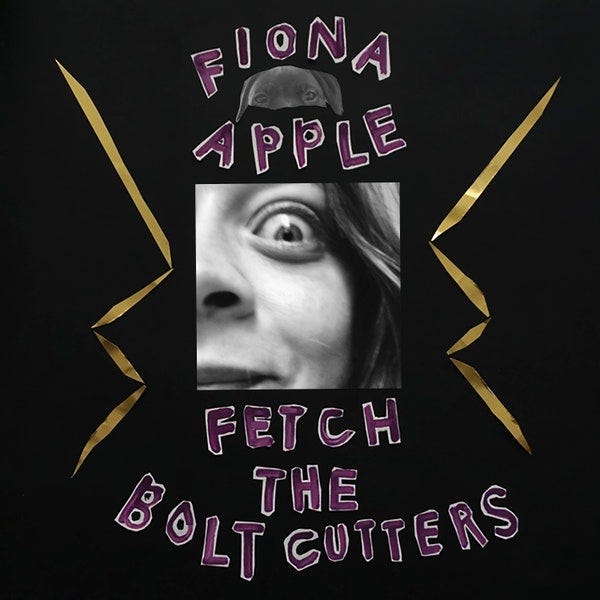still fetching the bolt cutters
3 years of covid, fiona apple, and the album we didn't know we needed
3 years ago, on April 17, 2020, Fiona Apple dropped an album we didn’t know we’d desperately need. The album in question, Fetch the Bolt Cutters, was supposed to be released in October 2020. But given its contents and the worldwide pandemic raging around us, Apple authorized a digital release.
I know exactly where I was when I listened to it for the first time. Well, we all probably do, because we were all Very Much Inside. It had become clear that quarantine was not going to be the two-week sacrifice on behalf of our fellow citizens that we had hoped it would be. We’d barely been outside. We were hoarding toilet paper and had become emotionally invested in our sourdough starters. I took to holding my breath while checking the mail and washing my hands like a surgeon every time I scampered back indoors. We lived on a major Brooklyn thoroughfare where all we heard were sirens day in and day out, all night long, as ambulances from as far away as Alabama and Colorado sped down the otherwise empty street.
And I was sitting on our living room couch, hollering to my now-husband in the other room to ask if he’d heard Fiona Apple dropped a new album. He had not. I pressed play, wearing my new uniform of Soft Clothes Only. As the meandering, building percussion and piano opening of “I Want You to Love Me” played, my now-husband and I met eyes and said to each other, Fuck, this is so good. Not to mention it was a nice break, or distraction from, all those goddamn dystopic sirens outside.
If you don’t know Fiona Apple, here’s a quick synopsis of her career: Apple is a singer-songwriter whose work encompasses rock, jazz, piano, and all kinds of experimentation. Her debut album, Tidal, was released in 1996 to great acclaim, particularly the hit single “Criminal.” She has caused her share of controversies however, including her infamous MTV VMA acceptance speech where she declared:
“So, what I want to say is, everybody out there that’s watching, everybody that’s watching this world? This world is bullshit. And you shouldn’t model your life about what you think that we think is cool and what we’re wearing and what we’re saying and everything. Go with yourself. Go with yourself…”
Since then, she’s gone on to release five albums and collaborate on countless more with other artists such as Andrew Byrd, Phoebe Bridgers, and beyond.
Fetch the Bolt Cutters went on to win a Grammy for Best Alternative Album, while the track “Shameika” won a Grammy for “Best Rock Performance.”
She’s an artist who was, and remains, ahead of her time. Her unapologetic candor surrounding her mental health, eating disorder, and trauma experienced as a teenager was not exactly championed in the happy-go-lucky 1990s. But in April 2020, it felt as if she’d spent the last five years writing and recording songs specifically for the anxiety-ridden time we’d found ourselves in. Put it another way, I wanted to know: did she know something the rest of us didn’t?
Apple has this way of singing that imbues her work with a pain and frustration that isn’t always obvious in her lyrics on first glance. That’s not to say her lyrics aren’t good—I’d argue she’s one of the best of her generation. But no one makes lines like “If I’m butter / then he’s a hot knife” sound as dangerous and seductive as she does.
But Fetch the Bolt Cutters? It was like a balm I didn’t know I needed.
In the words of SNL’s Stefan, this album had everything we needed in quarantine. The title track, “Fetch the Bolt Cutters,” truly feels as if it could have been written in late March 2020:
“Fetch the bolt cutters, I've been in here too long
Fetch the bolt cutters (I've been in here too long)
Whatever happens, whatever happens (Whatever happens)”
The song “Heavy Balloons” beautifully described depression and struggling not to succumb to it:
People like us we play with a heavy balloon
We keep it up to keep the devil at bay but it always falls way too soonI spread like strawberries
I climb like peas and beans
I've been sucking it in so long
That I'm bursting at the seams
And the political gut punch of songs like “For Her,” written in the wake of the Brett Kavanaugh confirmation hearings? That’s one of those songs you can’t unhear once you’ve heard it. Do you know what I mean?

Revisiting this album, as with revisiting all things from the first wave of the pandemic is equal parts surreal and stressful, nostalgic and dear. It was an album I played on repeat for months as I waited for restrictions to lift, a salve that didn’t fix the gaping wound but at least provided a bit of sweet relief, however short. And my only criticism of the album was just that—that it was too short. I could have listened to an album doubled in length and still loved it.
Going back to what soothed me in anxious times is a form of reflection, one that feels tender still as pandemic restrictions lift. Sometimes it brings me back to darker times, and I’m not always prepared for the repercussions of that. But revisiting albums like Fetch the Boltcutters is also a means of gratitude. I am immensely grateful for the art and media that carried me in the waves of fear and worry that washed over me—and all of us—in spring 2020. It allowed us a smidgen of pleasure in an otherwise horrific hellscape.
If you’ll indulge me, I’d like to add one more excerpt of a verse from Apple’s “Fetch the Bolt Cutters” to the end of this newsletter. Because if this verse doesn’t encapsulate my lived experience in April 2020, as well as the narrative I saw on social media back then? I don’t know could:
“While I'd not yet found my bearings…
So all I could hear was the noise that
People make when they don't know shit
But I didn't know that yet”
What album helped you get through the initial pandemic, quarantine slog? Or any other difficult, anxious time in your life? Let me know in a comment below!






